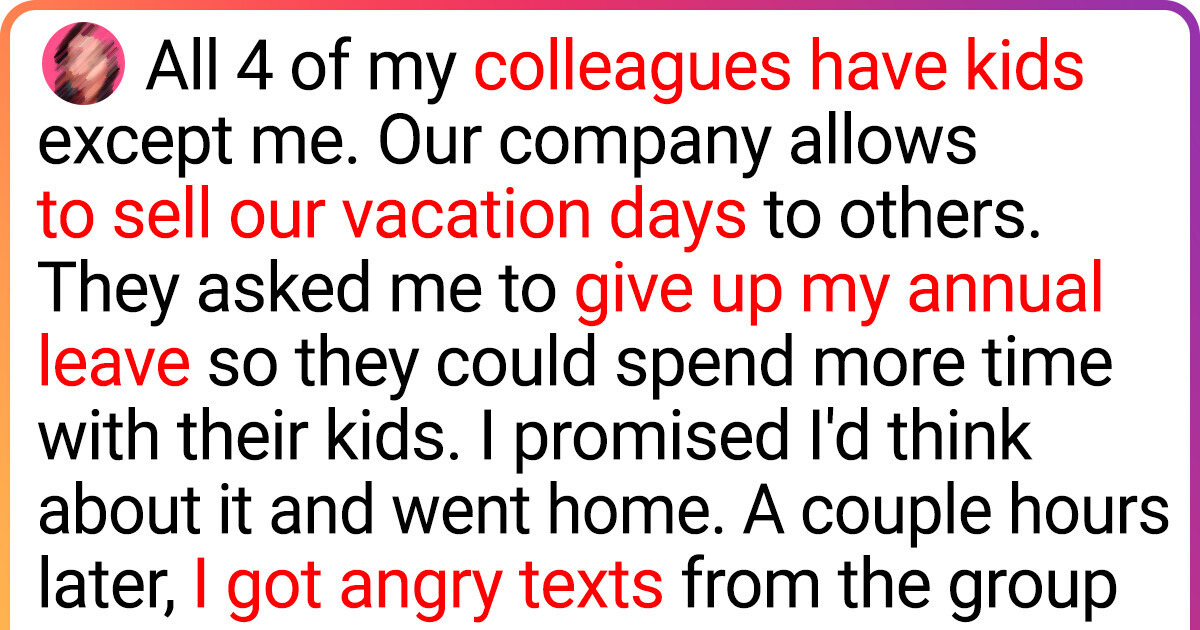Selling her leave? As in getting compensated financially for giving up her leave? Or donating it to them out of the goodness of her child free heart? If it were me, the minute I started getting heated comments, I would be heading straight for HR.
My Colleagues Think My Annual Leave Should Go to Them Because I Don’t Have Kids

In workplaces where teamwork is key, balancing personal needs with collective goals can sometimes be challenging. This is particularly true when personal circumstances, like family responsibilities, differ among colleagues. Our reader asks an advice about her workplace dilemma: should someone without children be expected to give up their vacation days so colleagues with kids can have more time off?
We received a letter from Sarah, who found herself at the center of a workplace conflict.
“All 4 of my colleagues have kids, unlike me. They often shared stories of PTA meetings, soccer games, and weekend family outings, leaving me silently nodding along, unable to contribute to conversations about parenthood. I chose to be child-free and never felt obligated to justify my personal decision, but it seemed to create a growing divide between myself and the rest of the team.”
“Our company allows to sell vacation days to others. This summer my colleagues asked me to give up my annual leave so they could split it among themselves. They said, “We’ve been talking, and we were wondering if you’d consider selling us some of your annual leave days. You know, since you don’t have kids to spend time with. It would help us out.”
“I felt a mix of surprise and indignation. I already had vacation plans, and just because I don’t have children doesn’t mean I’m not entitled to rest. Unsure how to respond, I simply smiled and said I’d think about it.”
This wasn’t the first time Sarah had helped her colleagues, but this time they crossed her boundaries.
“I’ve been volunteering for the Christmas shifts and other holidays, so they could spend time with their kids. But this time, I felt they were crossing a line. This request felt like an intrusion into my personal life. Their struggles with balancing work and childcare shouldn’t dictate how I use my time off. Why should I sacrifice my hard-earned vacation days just because I’m childless? It didn’t seem fair to me.”
“A couple of hours later, when I returned home, I received angry texts on our work chat. My colleagues started the conversation with, ’Sarah, we thought you’d be more understanding! We’re all in this together, and you’re being selfish by hoarding your vacation days!’”
Sarah wasn’t prepared for such an aggressive reaction from her colleagues.

“I took a deep breath before responding. ’I’m sorry if you feel that way, but my annual leave is mine to use as I see fit. I work just as hard as all of you, and I value my time off. I understand your situation, but it’s not fair to expect me to give up my leave just because I don’t have kids.’”
“Their responses came quickly, each more heated than the last. They accused me of not being a team player and argued that I didn’t understand the pressures of parenthood. But I couldn’t help thinking, their choice to become parents shouldn’t make me responsible for their decisions.”
“I tried to defend my position, but my arguments seemed to provoke even greater negativity. Am I wrong for refusing to give up my vacation simply because I don’t have children?”
We thank you for sharing your revelation and have prepared a few tips.
Dear Sarah, navigating workplace dynamics, especially when personal boundaries are tested, can be challenging. It’s clear you value your time off and rightly so—it’s yours to enjoy and recharge. Here are a few things to consider:
- Assert Your Boundaries: Your annual leave is a part of your compensation package and a benefit you’ve earned. It’s okay to assertively communicate that you have plans and need your time off, regardless of your colleagues’ situations.
- Stay Calm and Professional: In conversations about sensitive topics like this, maintaining a calm and professional demeanor will help you express your perspective clearly and assertively.
- Seek Support: If tensions continue, consider discussing the issue with your manager or HR department. They can guide company policies regarding vacation days and help facilitate a fair resolution.
- Emphasize Mutual Respect: Remind your colleagues that respect goes both ways. Just as you respect their family commitments, they should respect your need for personal time and choices.
- Look for Compromise: While you have every right to decline to sell your leave, consider if there are other ways you can support your team, such as adjusting schedules or workload temporarily.
Remember, your choices regarding your time off are valid and should be respected. By asserting your boundaries calmly and professionally, you can navigate this situation while maintaining positive relationships with your colleagues.
“I never force my son to say SORRY and THANK YOU — it could psychologically traumatize him,” another reader wrote to Bright Side to share her unique parenting style and to seek advice from other parents. She often faces criticism about her methods of upbringing and wants to know if other parents have had similar experiences.
Comments
Related Reads
12 People Share True Events That Marked Them Forever

I Banned My MIL From Our House After Overhearing What She Told My Husband

I Want to Divorce My Husband Because He Shaved My Head

Jason Momoa and Lisa Bonet’s Daughter, 16, Makes a Rare Appearance, People Notice the Same Thing

16 People Who’ll Make You Laugh and Facepalm at the Same Time

A Father Banned His Daughter From His Wedding, but She Was Not the One to Take It Easy

I Canceled My Husband’s Birthday Party After Hearing What He Secretly Told My Daughter

My DIL Excluded Me From Gender Reveal Party, Saying I’m "Not Family"—Big Mistake

My BFF Invited Me to Her Baby Shower, It Turned Into My Worst Nightmare

I Refuse to Keep Supporting My Daughter and Her 5 Kids for Free

20+ Moments That Remind Us That Kindness Costs Nothing but Means Everything

I Refuse to Let My Sister Step Inside the Home I Bought for Our Parents — and I’m Not Sorry

